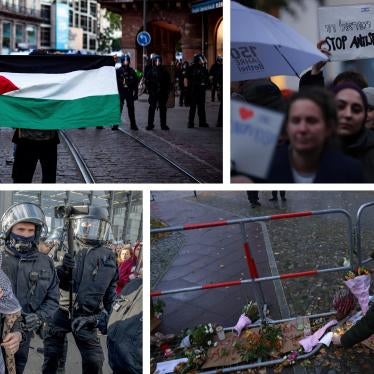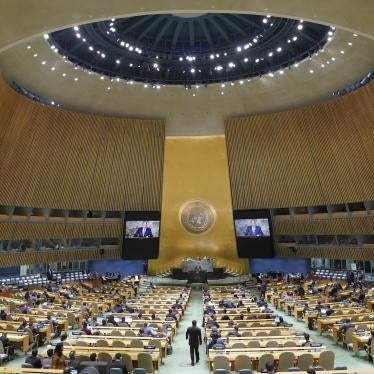In the aftermath of Hamas’s attack on Israel, and Israel’s ensuing bombardment campaign of the Gaza Strip, there is much discussion, by both experts and non-experts, about international humanitarian law (IHL), the law governing armed conflict and military occupation, and its application in the current hostilities involving Israel and Palestinian armed groups.
As accusations mount, it is important to understand the legal definition of terms such as ‘war crimes’ and what they mean in law.
IHL, or the laws of war, has existed in some form for thousands of years, but the modern version is set out in the Geneva Conventions of 1949, alongside other treaties, and customary international law.
It binds states, including Israel, as well as non-state armed groups that are involved in conflict, including Hamas and Islamic Jihad, even though they cannot formally ratify the treaties.
It is important to say that the rules of law are non-reciprocal, meaning that they apply irrespective of what the other side has done. Violations - such as deliberately targeting civilians or imposing collective punishment - can never be justified by claiming that another party has committed violations, or that there are power imbalances or other injustices
The laws of war only apply in specific situations, notably during an armed conflict or an occupation. Other laws, particularly international human rights law, apply at all times, governing the duties of all states to protect the rights of the people in the territory where they have jurisdiction or a degree of control.
International humanitarian law governs the conduct of hostilities and is distinct from the law that governs the decision to use force. Whatever the legality of a decision to use force, all parties must comply with IHL.
This body of law also governs occupation when a state has effective control, without consent, of a territory over which it has no sovereign title, such as the Israeli occupation of Palestinian territory.
Regardless of how many claims it makes about annexation, under IHL the occupying state does not acquire sovereignty over the occupied territory. The occupying power must ensure the humane treatment of the population and provide for their basic needs, including food and medical care.
Basic Rules of the Laws of War
The fundamental rule of international humanitarian law in conflict is that all parties must distinguish, at all times, between combatants and civilians. Civilians and civilian objects must never be the target of attack; parties may only target combatants and military objectives.
It is not simply enough to claim that civilians are not the target of the attack; international humanitarian law requires that the parties to the conflict must take all feasible precautions to minimise harm to civilians and civilian objects.
If an attack fails to discriminate between combatants and civilians or would be expected to cause disproportionate harm to the civilian population compared to the military gain, it is also prohibited.
Under IHL, anyone taken into custody, such as prisoners of war, must be treated humanely. Taking hostages and using people as “human shields” are prohibited.
In the case of an attack that may affect the civilian population, the laws of war require the parties to give “effective advance warning”, unless the situation does not permit it. What is effective depends on the circumstances, and if civilians are not able to leave for a safer area the warning will not be effective.
However, giving warning does not absolve parties from the requirement to protect civilians. Civilians who do not evacuate following a warning continue to be protected. They still must not be targeted, and attackers must take all feasible measures to protect them.
Statements that are not genuine warnings but are intended to use the threat of violence to spread terror among the population – such as by forcing them to leave – are prohibited.
Israel's Occupation
Israel has been occupying the West Bank, including East Jerusalem, and Gaza, which collectively constitute the Occupied Palestinian Territory (OPT), since 1967.
Contrary to what the Israeli government claims, Israel’s withdrawal of its ground forces from Gaza in 2005 did not end its occupation of Gaza.
That is because, ever since, Israel has maintained effective control over Gaza, including its territorial waters and airspace, the movement of people and goods, except at Gaza’s border with Egypt, and the infrastructure upon which Gaza relies, rendering the Strip an open-air prison.
Under IHL, Israel is required, as the occupying power, to make sure that the basic needs of the population of Gaza, such as food and water, are met.
International human rights law also governs the legal duties of the Israeli authorities towards the population of the OPT, especially given the long duration of the occupation.
In addition, Hamas, and the Palestinian Authority, which are de facto governing authorities over many Palestinians, have responsibilities to protect the human rights of the population they govern. Their functions do not negate Israel’s duties as the occupying power.
War Crimes
War crimes are serious violations of the laws of war committed by individuals with criminal intent, that is, deliberately or recklessly. War crimes include deliberately attacking civilians, taking hostages, and collective punishment.
Airstrikes and rocket attacks by Israel, Hamas and other armed groups that target civilians or are indiscriminate violate the laws of war, and, when committed with criminal intent, are war crimes.
Anyone who commits a war crime is criminally liable, as are those responsible for ordering, assisting in, or facilitating a war crime. Commanders and civilian leaders may be criminally liable under the principle of command responsibility if they knew or should have known about crimes their subordinates committed and failed to adequately prevent the crime or punish those responsible.
Over the course of the past 20 days, multiple war crimes have been and continue to be committed in Israel and Palestine, with grave concerns that Israeli forces and Palestinian armed groups are carrying out unlawful indiscriminate attacks harming civilians.
The deliberate killing of Israeli civilians and taking of hundreds of hostages by Hamas and other armed groups are war crimes, as is the launch of rockets indiscriminately at Israeli communities. About 1,400 Israelis have been killed since 7 October, according to the Israeli government.
Israel has continuously bombarded the densely populated Gaza Strip, home to 2.3 million. Over 7,000 Palestinians have been killed since 7 October, including almost 3,000 children, according to the Gaza Health Ministry. In some cases, bombs have turned entire blocks and even large parts of neighborhoods to rubble.
Israeli forces have used white phosphorus, a chemical that ignites when in contact with oxygen, causing horrific and severe burns, on densely populated neighborhoods. White phosphorus can burn down to the bone, and burns to 10% of the human body are often fatal.
Israel has also engaged in the collective punishment of Gaza’s population through cutting off food, water, electricity, and fuel. This is a war crime, as is willfully blocking humanitarian relief from reaching civilians in need.
During prior rounds of hostilities, including in 2021, Human Rights Watch documented serious violations of the laws of war by both Israeli forces and Palestinian armed groups.
There’s also concern about Israel ordering the displacement of much of Gaza’s civilian population, which is permitted only if required for the civilians’ security or imperative military reasons. The civilian population needs to be able to return as soon as possible - permanent displacement is a crime.
In addition, the Israeli occupying authorities have committed and continue to commit other international crimes, including with West Bank settlements. If the occupying power transfers any of its civilian population into the occupied territory, either directly or indirectly, it is a war crime.
Human Rights Watch and other rights organizations have also found that Israeli authorities are committing the crimes against humanity of apartheid and persecution against millions of Palestinians. The systematic oppression of the population of Gaza forms part of these ongoing crimes.
International crimes should lead to accountability. The International Criminal Court (ICC) in The Hague has jurisdiction over war crimes and other serious international crimes committed in or from the OPT (the territory of the State of Palestine, which is an ICC member), and by nationals of Palestine.
The court’s prosecutor has an ongoing investigation, which his predecessor opened in 2021, into possible crimes in Palestine.
Human Rights Watch has urged the prosecutor to make a clear formal statement about how the court’s mandate applies to the current context, which would provide a critical signal that all those responsible for war crimes could face prosecution.
Effective accountability is vital to ending the atrocities.









